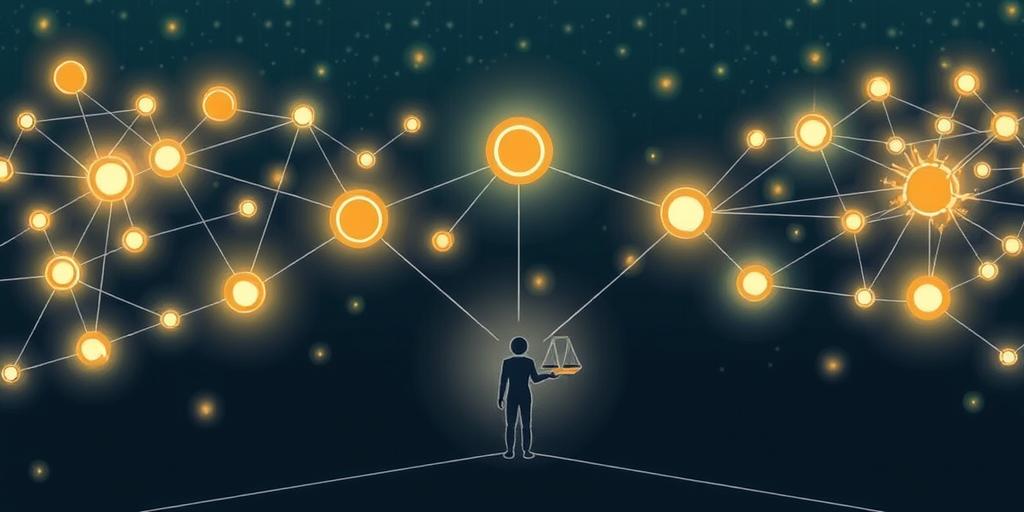Decentralization, the process of distributing power and control away from a central authority, is rapidly transforming various sectors. From blockchain technology to decentralized autonomous organizations (DAOs), this shift presents exciting opportunities but also raises significant ethical questions. Understanding these implications is crucial for harnessing the potential of decentralization while mitigating its risks.
1. Introduction
1.1 Defining Decentralization in the Context of Technology
Decentralization, in a technological context, refers to the distribution of data, resources, or power across multiple nodes or participants, eliminating the need for a single point of control. This contrasts with centralized systems, where a central authority manages all aspects of the system. Examples include blockchain networks, where transactions are verified across a distributed network, and peer-to-peer file-sharing systems, which distribute data across multiple computers. The rise of blockchain technology, in particular, has spurred significant debate concerning the ethical implications of decentralization.
1.2 Scope of Ethical Implications
The ethical implications of decentralization are vast and multifaceted. They extend beyond technological considerations, encompassing social, economic, and political dimensions. We must consider issues like privacy, security, accountability, transparency, and access. Understanding the ethical considerations surrounding decentralization is crucial for navigating its complexities and ensuring its responsible development and implementation. The impact of decentralization on society, particularly concerning ethics, is a growing area of research and debate.
2. Benefits and Challenges of Decentralized Systems
2.1 Enhanced Transparency and Accountability
One of the primary benefits of decentralization is increased transparency and accountability. Reduced centralized control means that actions and decisions are more readily auditable. For instance, blockchain technology allows for the tracking of transactions with a high degree of traceability, enhancing accountability and reducing the potential for fraud. This enhanced transparency is a critical element in building trust in decentralized systems.
2.2 Concerns Regarding Privacy and Security
Despite the advantages, decentralization also presents significant privacy and security challenges. Data breaches and vulnerabilities can be more difficult to address in decentralized systems due to the distributed nature of data. The anonymity and pseudonymity features often associated with decentralized technologies, while beneficial for privacy in some contexts, can also facilitate illegal activities. Balancing privacy with security remains a key ethical challenge.
2.3 Accessibility and Inclusivity
Decentralized systems offer the potential to bridge the digital divide and promote inclusivity by providing access to resources and services without intermediaries. However, barriers to entry and participation still exist. Technical expertise, access to technology, and digital literacy are all factors that can limit access to these benefits, creating new forms of exclusion.
3. Specific Ethical Dilemmas in Decentralized Applications
3.1 Decentralized Finance (DeFi) and Financial Risks
The rapid growth of Decentralized Finance (DeFi) has introduced unique ethical challenges. Algorithmic bias and discrimination can emerge in DeFi applications, perpetuating existing inequalities. The lack of regulatory oversight in many DeFi ecosystems creates significant risks for consumers, requiring careful consideration of ethical frameworks for decentralized governance. Smart contracts, the foundation of many DeFi platforms, can be exploited if not designed and implemented carefully.
3.2 Decentralized Autonomous Organizations (DAOs) and Governance
DAOs, governed by smart contracts, present novel challenges to traditional notions of accountability and decision-making. Determining responsibility for actions taken by a DAO can be complex, particularly in cases of misuse or manipulation. Establishing clear ethical guidelines for DAO governance is essential to mitigate these risks and ensure responsible operation. The ethical considerations decentralized autonomous organizations present are a significant area of ongoing study.
3.3 Decentralized Social Media and Content Moderation
Decentralized social media platforms aim to empower users and reduce centralized control over content moderation. However, this approach can lead to the spread of misinformation and hate speech, posing significant ethical challenges. Balancing free speech with the need to prevent harm requires innovative approaches to content regulation and moderation.
4. Addressing Ethical Concerns in Decentralized Systems
4.1 Promoting Responsible Development and Implementation
Addressing the ethical implications of decentralization requires a commitment to responsible development and implementation. This includes rigorous testing, security audits, and ethical reviews of decentralized systems before deployment. Prioritizing user privacy and security throughout the design and development process is crucial.
4.2 Establishing Ethical Frameworks and Guidelines
Developing clear ethical frameworks and guidelines for the design, development, and use of decentralized technologies is essential. These frameworks should address issues such as data privacy, security, accountability, and access. Collaboration between technologists, ethicists, policymakers, and the wider community is vital in establishing these frameworks.
4.3 Fostering Collaboration and Dialogue among Stakeholders
Addressing the ethical challenges of decentralization demands collaborative efforts from diverse stakeholders. Open dialogue among technologists, policymakers, ethicists, and users is crucial for developing effective solutions and promoting the responsible use of decentralized systems. This collaborative process can help to establish shared understanding and address emerging ethical concerns. The impact of decentralization on society, particularly in the realm of ethics, requires careful consideration and ongoing discussion.
The ethical implications of decentralization are complex and evolving. Navigating these challenges requires a multi-faceted approach that prioritizes responsible development, robust ethical frameworks, and ongoing dialogue among stakeholders. As decentralization continues to reshape various aspects of our lives, a proactive and collaborative approach is necessary to harness its potential while mitigating its risks and ensuring its ethical implementation. Future research should focus on developing practical tools and methodologies for assessing and managing the ethical risks associated with decentralized technologies, further refining ethical frameworks for decentralized governance, and exploring innovative solutions to address the challenges of privacy, security, and access in decentralized systems.




